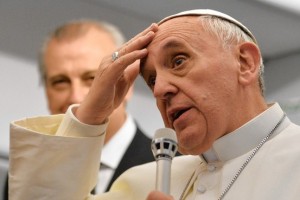A group of theologians has produced a scholarly, theological and pastoral response to Cardinal Kasper's proposals with regard to admitting divorced and remarried Catholics to Communion. Published in the Nova et Vetera journal, the paper is well worth reading and well worth making people aware of it. In thirty pages it not only demolishes the Cardinal's proposals, but serves as an excellent catechesis on marriage. I am including a link to the article and urge you to read it.
What is clear from this piece is that the upcoming Synod cannot diverge from current practice, for to do so would ultimately be a rejection of Jesus' clear command.
Three things which resonated with me in the article. First, that there is a crisis of chastity in the contemporary world. That is true. The theologians correctly point out that this crisis "plays no small part in the crisis of marriage and family life". The thesis proposed by Cardinal Kasper seems to be one which appears to me, emerges out of a spirit of despair in response to this crisis of chastity. As the Cardinal himself said, we ordinary people are not called to be heroic, it may well be impossible for us in the opinions of some; could we also say that we ordinary people are not called to be chaste - it is impossible for us? That would be a problematic opinion one which denies many teachings of Christ, but most importantly seems to deny the efficacy of God's grace. The Church will need to address the crisis of chastity in the modern world.
Secondly, the theologians note:
"The sexual revolution has caused millions of casualties. They have deep wounds, hard to heal. Challenging as this situation is, it also represents an important apostolic opportunity for the Church. Human beings frequently have an awareness of their failings and even their guilt, but not of the remedy offered by the grace and mercy of Christ. Only the Gospel can truly fulfill the desires of the human heart and heal the deepest wounds present in our culture today."
They are correct here. We will never heal the wounds inflicted by the sexual revolution by jettisoning Christ's and the Church's teaching on human sexuality to adopt a more permissive, relativistic approach. That would simply be pouring petrol on a fire. The Church is meant to be prophetic in the world and here is her ideal opportunity. The fact that being prophetic in regard to human sexuality at this time will be extremely difficult, should not put pastors and people off. No one ever said it was easy to be a Christian, no one ever said it would not be difficult to do the right thing. But we have to, no only for Christ's sake and the sake of the Church, but the sake of those who are victims of the sexual revolution.
Finally, a point I have been making for some time, the theologians advise that "ministers of the [marriage] tribunal need sufficient time to dedicate themselves to the cases assigned to them and should not be overburdened with other time-consuming tasks". And: "Tribunals need to be adequately staffed and supported so that cases can be treated with dispatch while following sound canonical norms and procedures. Those assigned to tribunals need sufficient time to carry out their duties and should not be saddled with other time-consuming charges."
Too often in dioceses and episcopal conferences marriage tribunals do not get the staff or resources they need to do their work efficiently and quickly. I know priests who do Trojan work in tribunals, but they are juggling that work with parish assignments and other jobs passed down from chanceries. In my view that is unacceptable, and the theologians seem to agree with me there. The work of the tribunal is an important pastoral work and deserves to be treated as such. Too many people are waiting too long for decisions from tribunals which can often be held up because those working in them can only deal with their cases for a day or two a week. No doubt someone will quote me priest shortage and finance: well I can see other projects which do not suffer from such a lack. The tribunal must be near the top of a diocese or province's priorities.




